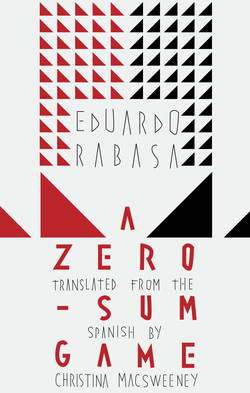Читать книгу A Zero-Sum Game - Eduardo Rabasa - Страница 3
На сайте Литреса книга снята с продажи.
ОглавлениеInternational Praise For A Zero-Sum Game
· Shortlisted for the PREMIO LAS AMÉRICAS, (for Debut Novel), given by the Festival de la Palabra from Puerto Rico to the best Spanish-language book of the year
· Selected among the 10 best books of the year by Nadal Suau, Periódico ABC (SPAIN)
· Selected among the 6 best books of the year by the literary blog, La medicina de Tongoy (SPAIN)
· Selected among the 10 best books of the year by Sergio González Rodríguez, Periódico Reforma (MÉXICO)
“A Zero-Sum Game is an outstanding political fantasy. Eduardo Rabasa has written a futuristic novel set in the present; its inventiveness is not based on new technologies but rather on new kinds of relationships. It’s a novel about the most complicated of extreme sports: cohabitation.”
—JUAN VILLORO, author of God is Round and The Guilty
“An amazing novel. On reading it, I felt myself to be immersed in a world that, as in certain works by Bolaño, transcends the characteristics typically associated with the Latin American novel. A Zero-Sum Game carries readers to regions of the imagination which subtly suggest the best of the Central European tradition. The sensation is as real as it is unsettling and, somehow, after a time, gives rise to an awareness of where we actually are. The prose rests firmly on a set of coordinates that can only be Mexican, revealing a totality of truths that reflect the complex texture of a country and a society immersed in a moment of violent convulsion. Few recent novels have managed to surprise me so greatly as A Zero-Sum Game.”
—EDUARDO LAGO, author of Call me Brooklyn
“The comparisons to Nineteen Eighty-Four are inevitable (…) However, A Zero-Sum Game is closer to A Brave New World than to the Orwellian dystopia.”
—VICTOR PARKAS, El País
“Meticulous, written with a harsh language, this is the portrait of a suffocating microcosm in which hierarchies are fixed by the illusion of a social progress that will never arrive. Rabasa dismantles with precision the mechanisms of a false democracy, in which no political alternation is possible (…) A mirror of some Latin American countries, this dense novel offers a pertinent reflection about the ways in which a regime can exercise violence today: less by outright repression and more through it’s capacity of imposing a deadly lethargy on people.”
—ARIANE SINGER, Le Monde
“This is an important novel. In terms of narrative, what the literary critics might call the central theme—power, our relationship with power, the power of power—is very deftly handled, and is combined with stories that interweave in perfect harmony. Rabasa’s decision to set the novel in an insignificant place, which works as a mirror to anywhere in the world, was a very wise one; more wise still is the satirical tone which reveals itself in his functional prose (that is, prose that functions well). Nowhere in recent times have I read a better portrait of how things are shaped – or how those things, over time, shape us.”
—JUAN BONILLA, author of Prohibido entrar sin pantalones, awarded the first PREMIO BIENAL DE NOVELA MARIO VARGAS LLOSA
“[Rabasa’s] first novel, A Zero-Sum Game, collects outbursts of passionate love, of the conflicting relationship between a father and a son, and, above all, of a critique to democracy in the shape of political satire…Rabasa gives an unexpected turn to the genre of novels of social criticism, a literary tradition from which the author hopes to obtain the formula that allows him to think and understand the present…A demolishing piece of work, perfectly suited for Rabasa, an eternal restless soul, and one who invites to share in the pleasure of literature from his double role as a publisher and writer.”
—LEONARDO TARIFEÑO, Revista Vice
“Rabasa’s satirical vocation is cristallized in a cumulative effect that at times recalls the transversal cut with which Georges Perec sketched the life of the tenants of a building in La Vie mode d’employ, or the eagle-eye with which Damián Tabarovsky followed the comings and goings of a leaf that glides over a street of Buenos Aires in his novel-essay Una belleza vulgar.”
—GUILLERMO NÚÑEZ, Frente
